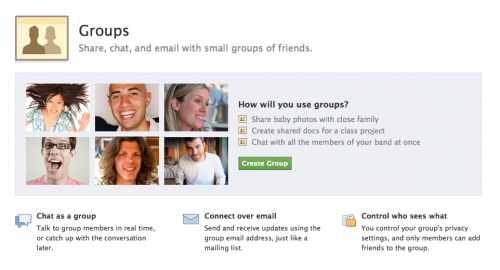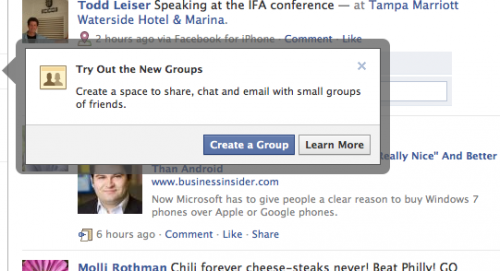Facebook Introduces Private Groups, Allows Export Of Personal Data
In a bid to give users more tools and control over the sharing of information (and perhaps preempt Google) Facebook introduced a new way to create and communicate with small private groups of people. Through an API this same functionality will be extended to publishers and third party developers like Facebook Connect is today. The […]
In a bid to give users more tools and control over the sharing of information (and perhaps preempt Google) Facebook introduced a new way to create and communicate with small private groups of people. Through an API this same functionality will be extended to publishers and third party developers like Facebook Connect is today.
The new tool/service, as one might predict, is called Groups. It’s a new “from the ground up” product and largely supersedes the old Facebook groups and friend lists.
The absence of easy ways to share information privately with smaller groups has been one of Facebook’s perceived vulnerabilities and a potential entry point and differentiator for a hypothetical “Google Me.”

Facebook CEO Mark Zuckerberg characterized the new Groups offering as “a great product and better than anything else out there” (i.e., Yahoo Groups, Google Groups). Facebook said it wouldn’t eliminate friend lists and the older groups product. But the expectation is that these older tools and features will be used less and less over time.
Fundamentally the new Groups, which includes wiki-like/Google docs functionality, group chat and group email, is intended for collections of users that are relatively small.
In response to a question about how brands and advertisers might use the new Groups Zuckerberg reinforced the notion of small private associations of people (work, family, friends). He said that Groups probably wouldn’t give brands and advertisers the scale or reach that they typically want. He said that Pages was a better place for brands and advertisers to interact with their fans.
The explicit intention is for groups to be used by fewer than 100 people or by many fewer — less than 20. But a parallel point was made that the underlying groups “platform” will be scalable across the Web.
Many privacy related questions were asked by journalists at the press conference. There are a number of controls to enable individuals protect their information and participation. Facebook said that there would be three types of groups: open, closed and secret.
- Open: these groups will essentially be entirely public; people will be able to see members and the group’s content
- Closed: the group’s existence and members can be seen, however its content will not be visible to outsiders
- Secret group: both the content and membership will be invisible to anyone outside the group
Zuckerberg predicted that Groups will cause a fundamental shift in the way that people use Facebook. In a separate announcement the company also said that it would allow individuals to download and take all their data, posts, images and videos off the site if they so chose. Few will probably do anything like this; it’s a kind of confidence boosting measure and “insurance policy” in a way. It reinforces the notion that individuals on Facebook own and control their own data and information. This stands in marked contrast to some of the little reviewed terms of service on many other sites that stipulated all user-generated content was owned by the portal or publisher.
The new Groups offering is live now. It should very quickly become a hugely successful product for Facebook and will create further headaches for anyone (read Google) trying to exploit holes in Facebook’s products to better compete with them.
More information:
Contributing authors are invited to create content for Search Engine Land and are chosen for their expertise and contribution to the search community. Our contributors work under the oversight of the editorial staff and contributions are checked for quality and relevance to our readers. The opinions they express are their own.
Related stories
New on Search Engine Land
